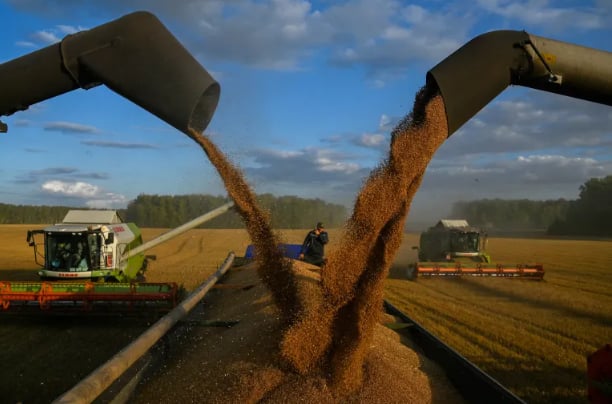November 23, 2025 | 13:27 GMT +7
November 23, 2025 | 13:27 GMT +7
Hotline: 0913.378.918
November 23, 2025 | 13:27 GMT +7
Hotline: 0913.378.918

Combines load wheat into a truck during the harvest in the Cherlaksky district of Russia's Omsk region.
European Union trade ministers have agreed to impose prohibitive tariffs on grain and other agricultural products from Russia and Belarus from July 1.
The tariffs will be 95 euros ($102.76) per tonne for cereals and 50 percent of their value for oilseeds. Tariffs will also apply to beet-pulp pellets and dried peas. The ministers’ decision on Thursday follows a proposal from the European Commission on March 22.
The announcement of the new tariffs quickly drew Russian disapproval.
“The new messages from the EU will yet have to be analysed, but their ideology is clear – they want to squeeze Russia out of everything,” Russian Ministry of Foreign Affairs spokeswoman Maria Zakharova told reporters at a weekly briefing.
Vincent Van Peteghem, the finance minister of Belgium, which holds the rotating presidency of the EU, said the new tariffs were intended to stop imports of grain from Russia and Belarus into the EU “in practice”.
“These measures will, therefore, prevent the destabilisation of the EU’s grain market, halt Russian exports of illegally appropriated grain produced in the territories of Ukraine and prevent Russia from using revenues from exports to the EU to fund its war of aggression against Ukraine,” he said.
The EU’s grain imports from Moscow have risen since Russia’s invasion of Ukraine in February 2022.
Figures from the Eurostat statistics office show imports grew from under 120 million euros ($130m) in 2020 to 290 million euros ($314m) in 2021 and 440 million euros ($477m) in 2023.
Last year, Russia exported 4.2 million tonnes of cereals and related agricultural products to the EU worth 1.3 billion euros ($1.4bn). This represented about 1 percent of the EU market.
The commission has said there was a risk that imports could increase, given Russian overall wheat exports had risen to 50 million tonnes from the usual 35 million tonnes.
EU ministers said the increase in customs duties would not harm global food security because it would not affect the transit of the products through EU territory to third countries.
(Aljazeera)

(VAN) In a new study published in Trends in Biotechnology, researchers used a gene-editing technology called CRISPR to increase a fungus's production efficiency and cut its production-related environmental impact by as much as 61%- all without adding any foreign DNA.

(VAN) A top official in Beijing’s Cop delegation says China is committed to clean energy – but US’s absence is a problem.

(VAN) The Bangsamoro region’s inflation rate rose slightly to –1.3 percent in October 2025 from –1.5 percent in September, the Philippine Statistics Authority (PSA-BARMM) reported.

(VAN) FAO-led report says protecting and restoring forests is crucial to boosting climate-resilient agriculture, rural livelihoods and global food and water security.

(VAN) Flagship partnership secures additional GBP 16.9 million to strengthen forest monitoring, transparency and country support to 2030.

(VAN) After a turbulent year for international development, the aid and assistance landscape has shifted, with donors rethinking how, where and why they support sustainable development.

(VAN) A new tool for measuring the economic value of farm animal welfare improvements has been developed, potentially transforming how consumers, retailers and the government evaluate animal welfare policies.